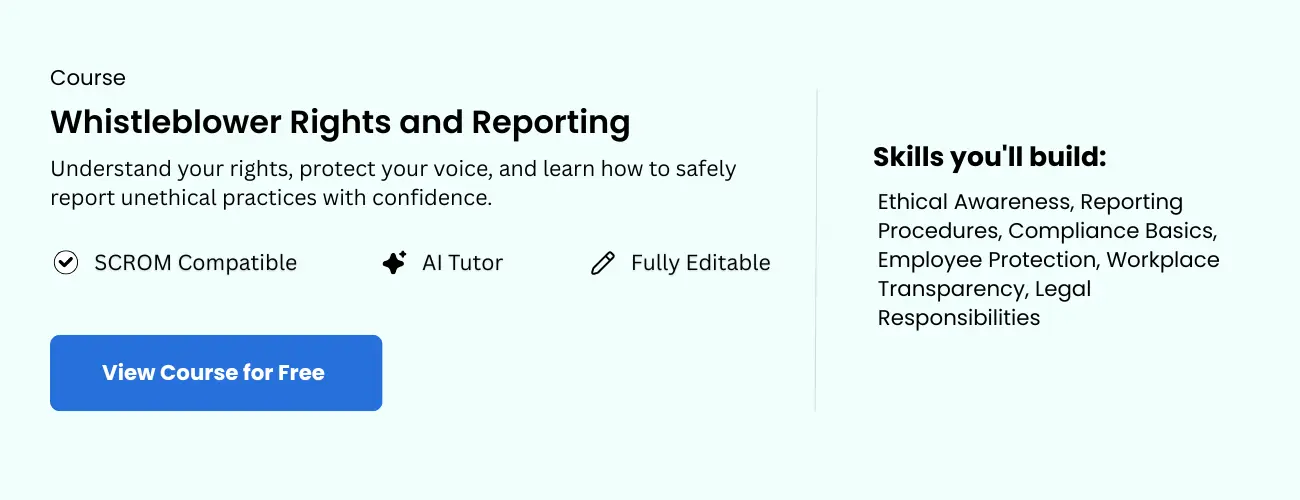Whistleblower training for employees is critical in ensuring that organizations maintain ethical standards, foster transparency, and protect those who report wrongdoing. This guide explores the importance of whistleblower training, its benefits, and how organizations can implement it effectively in the workplace.
What is Whistleblower Training?
Whistleblower training equips employees with the knowledge and tools to report unethical behavior, fraud, safety violations, and other workplace misconduct without fear of retaliation. This training is designed to ensure employees understand their rights, the reporting processes, and the protections available to them when they speak up. Whistleblower training emphasizes creating a culture of integrity, where individuals feel empowered to report violations of laws, policies, and ethical norms.
Why Whistleblower Protection is Crucial for the Workplace
Effective whistleblower protection training ensures that employees feel safe when reporting issues. When employees understand that their voices will be heard and that they won’t face retaliation, they are more likely to report misconduct, leading to better workplace compliance and ethical standards. Whistleblower protection helps build a supportive environment where workers can make ethical decisions without fear of punishment. It also promotes transparency, leading to a reduction in workplace corruption and fraud.
The Importance of Protecting Whistleblowers
While reporting misconduct is crucial for organizational integrity, many employees fear retribution, such as job loss or harassment. Whistleblower protection helps eliminate these fears and ensures that employees who report unethical practices are shielded from negative consequences. Protecting whistleblowers not only safeguards their rights but also encourages others to speak up. This builds a culture of ethical conduct and reduces the likelihood of misconduct going unchecked.
Key Elements of Whistleblower Training
An effective whistleblower training program covers various components to ensure employees understand both the process and the protections available. Below are the key elements to include in your whistleblower training program:
- Understanding the rights of whistleblowers
- The process for reporting unethical behavior, including the steps to take and the channels available
- Training on how to protect sensitive information and ensure confidentiality
- Confidentiality assurances to ensure that reporters’ identities are protected
- Anti-retaliation policies and the consequences for retaliating against whistleblowers
- The legal protections and support available to employees in whistleblower cases
Benefits of Whistleblower Training for Employees
Whistleblower training offers numerous benefits for both employees and organizations. By creating a transparent and accountable work environment, businesses can prevent misconduct, protect their reputation, and enhance employee morale. Let’s look at some of the key benefits:
1. Promotes Ethical Behavior and Accountability
Whistleblower training encourages a culture of integrity and accountability. Employees become more aware of what constitutes unethical behavior and are empowered to report violations without fear. This helps mitigate unethical conduct and supports the organization’s long-term goals of accountability and transparency. A culture of accountability not only prevents fraud but also fosters trust among employees and leaders.
2. Protects the Organization’s Reputation
Proactively addressing misconduct through effective training helps avoid legal issues and reputational damage. Organizations that prioritize transparency and ethical behavior are viewed more favorably by customers, clients, and stakeholders. A strong reputation for upholding ethical standards can also make the organization more attractive to top talent, clients, and investors.
3. Improves Workplace Safety and Compliance
Whistleblower training for employees enhances workplace safety by encouraging the reporting of safety hazards, harassment, and other violations. It helps organizations stay compliant with industry regulations and laws, minimizing risks and liabilities. In highly regulated industries, such as healthcare and finance, whistleblower training ensures that employees understand the importance of adhering to compliance requirements, further reducing risks to the company.
How to Implement Whistleblower Training
Implementing an effective whistleblower training program requires careful planning, clear communication, and ongoing support. Here are the steps to help organizations integrate whistleblower protection training successfully:
1. Develop Clear Policies and Procedures
A comprehensive whistleblower policy should outline the rights of employees, the procedures for reporting violations, and the protection measures in place. It’s essential that these policies are communicated effectively to all employees. Policies should clearly define what constitutes a reportable offense, how reports will be handled, and the consequences of retaliating against a whistleblower.
2. Conduct Regular Training Sessions
Whistleblower training should not be a one-time event. To keep employees informed, organizations should offer periodic training sessions, ensuring that employees are always aware of how to report misconduct and what protections they have. Training should be refreshed regularly to stay up-to-date with any changes in the law, company policies, or industry standards.
3. Provide Accessible Reporting Channels
Employees need multiple avenues to report misconduct. Whether it’s a hotline, email, or an anonymous reporting platform, ensuring that employees can report in confidence is crucial for the success of the program. It’s also important that these reporting channels are easy to access and understand, ensuring employees don’t hesitate to use them when needed.
4. Enforce Anti-Retaliation Measures
For whistleblower training to be effective, employees must be assured that they won’t face retaliation for reporting misconduct. Organizations should enforce strict anti-retaliation policies and make sure employees are aware of the consequences for retaliating against whistleblowers. These protections should be a core component of the organization’s culture and reflected in everyday business operations.
Whistleblower Training Best Practices
To ensure that your whistleblower training is effective, consider these best practices:
- Ensure training is interactive and engaging with real-life case studies and examples.
- Offer training in various formats (eLearning, in-person, etc.) to accommodate different learning styles.
- Integrate whistleblower training into the onboarding process for new employees.
- Continuously assess and improve the training program based on employee feedback and organizational needs.
- Use technology to streamline the reporting process and make it easier for employees to submit complaints anonymously.
- Incorporate feedback loops where employees can review and provide input on how the program could be improved.
Whistleblower Training in the Digital Age
In today’s digital world, organizations must adapt their whistleblower training to address new technologies and communication channels. Many employees are working remotely, and more complaints are being made through digital means. It’s essential that whistleblower training incorporates digital reporting tools that are secure and accessible. Companies must ensure that employees can easily file reports via secure web forms, mobile apps, or anonymous email systems. Furthermore, training should include guidance on how to handle reports involving digital misconduct, such as cyberbullying, data breaches, and inappropriate online behavior.
Conclusion: Empowering Employees Through Whistleblower Protection
In conclusion, whistleblower training is a vital part of any organization’s commitment to ethical behavior and compliance. It not only protects employees from retaliation but also fosters a transparent, accountable work environment. By providing employees with the necessary tools to report misconduct, businesses can ensure a safer, more ethical workplace for everyone. Organizations that invest in whistleblower protection training will reap the benefits of improved morale, greater accountability, and a stronger reputation for integrity in the long run.























